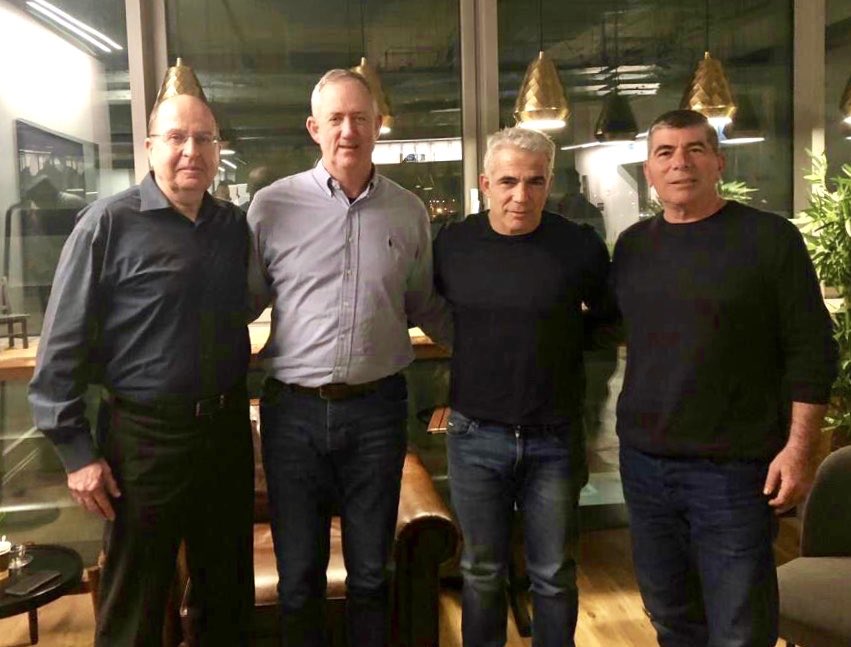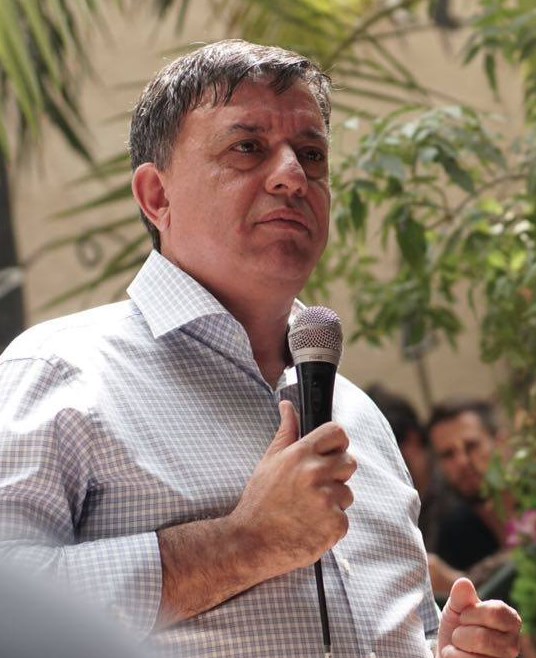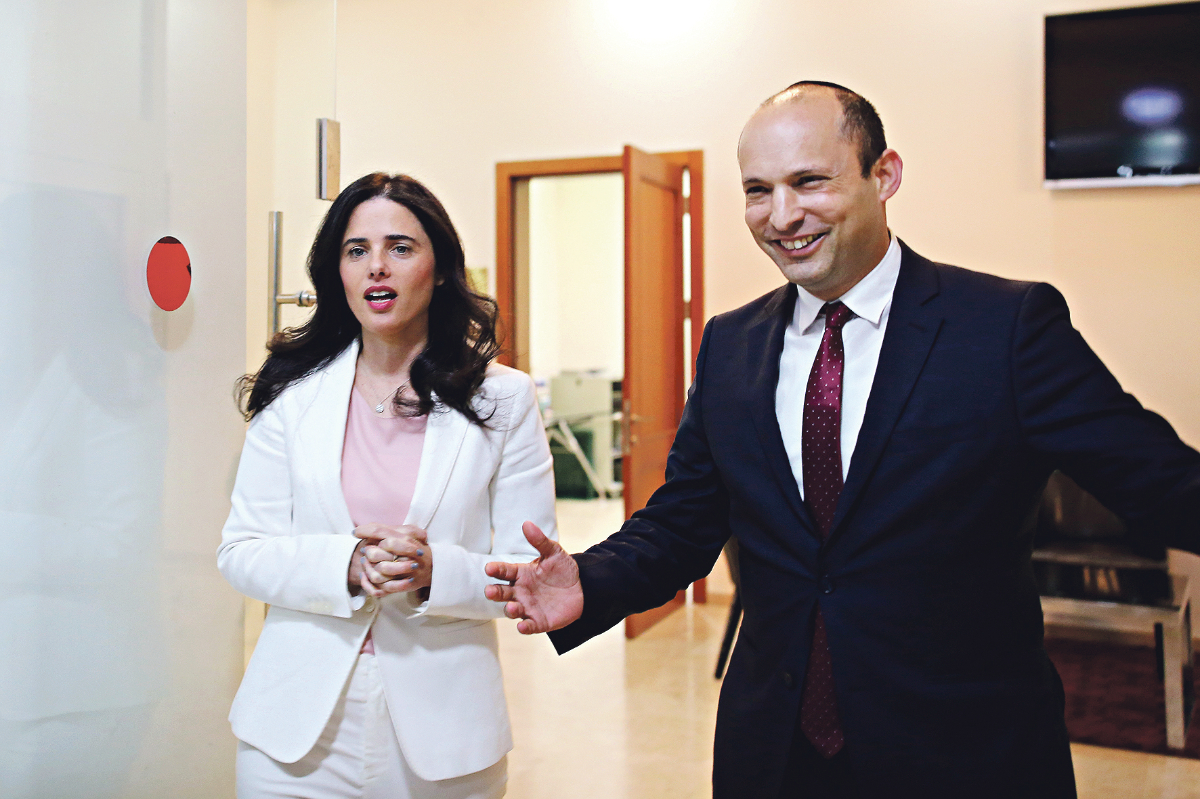Braced for battle of the Benjamins
With five days until the Israeli election and voters set to choose from an array of parties, political consultant Jodie Cohen delivers her verdict on the key issues facing voters
On Tuesday, Israel’s 6.3 million eligible voters will cast their ballot. The winning party will be asked by President Reuven Rivlin to form a government, and join with others to secure at least 61 seats in a coalition.
Surprisingly for some, the latest polls suggest most Israelis think Benjamin Netanyahu is too weak on Hamas in Gaza. Despite this, a Channel 13 poll shows 51 percent still want him to lead the country. This compares to just 36 percent for his main rival, former Israel Defence Forces Chief of Staff Benny Gantz.
Netanyahu’s party, the right-wing Likud, is currently neck and neck with Gantz’s party, Blue and White, according to the Channel 13 poll (predicting 30 seats each). However, Likud is expected to form the next government. That’s because more parties are saying they will recommend Netanyahu for prime minister to Rivlin.
Get The Jewish News Daily Edition by email and never miss our top stories Free Sign Up
Likud Knesset member Sharren Haskell explains: “Likud stands for security and the economy. People want strong security, but also less regulation, lower taxes and a free market. Israel faces violence from Gaza, Syria and Hezbollah, as well as a nest of terror in Egypt. We must be responsible and firm in our response, and we are managing the situation as it happens.”
Israel’s new centrist party
Kachol Lavan (Blue and White) disagrees. This is the new centrist list set up by Gantz, who joined with Yair Lapid’s Yesh Atid, Moshe Ya’alon’s Telem, and another former IDF chief of staff, Gabi Ashkenazi, to maximise their chance of beating Netanyahu.
“Blue and White brings together different opinions and 120 years of military experience at the helm of the party,” said candidate Michal Cotler, daughter of well-known Canadian former minister, Israel supporter and human rights legal expert, Irwin Cotler.
“Despite the divisive internal discourse we’ve seen in Israel recently, we have been able to agree a platform of principles that all – from the responsible right to the Zionist left – can agree on. The government needs to stop paying protection money to Hamas, and use international law to protect Israel,” she explained.

Left is best?
For voters on the left, HaAvoda (Labor) is currently the second biggest faction in the Knesset, with 18 seats. Led by Avi Gabbai, the party describes itself as ‘social democrat and Zionist’ but is predicted to win just 10 seats in the forthcoming election.
Further to the left is Meretz, led by Tamar Zandberg, with five seats in the current Knesset. Meretz representative and life partner of Zandberg, Uri Zaki, outlined the party’s vision. “Meretz’s election ad features a leader I admire, Menachem Begin, and a leader I love, Tamar Zandberg. The essence of both of their leadership is a strong commitment to democracy.

“Begin was brave enough to make peace with Egypt, then Israel’s greatest enemy, evacuating all settlements there. Netanyahu isn’t a warmonger – he’s acting responsibly and is in fact an ally of Hamas. But he’s managing the conflict instead of solving it. We believe the way to solve it is through political agreement with Ramallah… Begin’s way.”
Even further to the left are the Arab parties. The Joint Arab List is currently the third largest group in the Knesset. The Arab Israeli Hadash-Ta’al party is predicted to win seven seats in the next Knesset, with Ra’am-Balad expected to win four seats.
A look to the right
Some political analysts argue that the left simply don’t have enough votes to form the next government. That’s why HaYamin HaChadash (or New Right) – set up by former Bayit Yehudi leader and current Education Minister Naftali Bennett and Minister of Justice Ayelet Shaked – say voters on the right shouldn’t worry about voting for Likud, but should back them instead.
“A vote for us is actually like voting twice, because it’s a vote for us and for Netanyahu… we will recommend Netanyahu as the next prime minister,” explains veteran political commentator and HaYamin HaChadash candidate Caroline Glick.
“HaYamin HaChadash is going to make sure Likud governs from the right. We believe there needs to be accountability in the justice system, and we won’t agree to a Palestinian state to the west of the Jordan.”

There has been much controversy over the inclusion of the Kahanist party Otzma Yehudit into the new Union of Right Wing Parties. Led by Rafi Peretz, the group also includes Bayit Yehudi and HaIchud HaLeumi. The move to include Otzma Yehudit was encouraged by Netanyahu to ensure the group passes the minimum threshold of 3.25 percent to enter parliament.
Likud’s Haskell explained the move. “A true democracy listens to its voters. If Israel didn’t vote for this party, then they wouldn’t be in the Knesset. I disagree with a lot of their views, but I am far more scared of the left having more mandates. The left will join with the Arab parties whose ideology is anti-Israel.”
Regarding the Union of Right Wing Parties’ platform, Orli Rapaport from Bayit Yehudi said they believe that “to defeat terror we must not surrender to it”. She added: “We must fight back hard. We need to show our enemies we are not going away.”
Trump’s much-trumpeted middle east peace plan
Like Margaret Thatcher once famously talked of ‘education, education, education’ being her primary focus, the key issue on most Israeli voters’ minds is security, security, security.
So where do the parties stand on Trump’s ‘deal of the century’, which is expected
to be launched after the election?
Unsurprisingly, Union of Right Wing Parties’ Rapaport said: “We would not give up one inch of Israel.”
HaYamin HaChadash’s Glick spoke of a Palestinian state west of Jordan being an existential threat to Israel.

“We can’t allow any of the land to be given to the Palestinians. We’re very concerned about the prospect of a Likud–Blue and White coalition. We need a strong, right-wing government so we don’t have to divide Jerusalem, and we need to make it clear to our friends in the Trump administration that we need a new direction.
“However, one of the thousands of things that distinguishes the Trump administration from Obama’s is that we can talk to them.”
Likud’s Haskell said they wouldn’t be giving up any part of Jerusalem either. She added: “The prime minister has said the first call he will make is to HaYamin HaChadash and Jewish Home. After, and if needed, the next will be to Blue and White, but anyone who joins the coalition will have to agree to the coalition principles.”
Blue and White’s Cotler said: “We are the only party to have published a clear platform. This says that Jerusalem must be the united, eternal capital of Israel.”
Meanwhile, Zaki from Meretz said: “There won’t be a serious peace plan that could work that doesn’t include a division of Jerusalem, but with access for all. The Temple Mount, Western Wall and Church of the Holy Sepulchre should have a special status.”
Will it be the two Benjamins?
While polls are being conducted every day in the lead-up to the elections and are notorious for getting things wrong, they do provide an indication of where the electorate is headed.
Overall, the Channel 13 poll predicted 56 seats in total for the centre-left block,
spanning Blue and White through to the Arab-Israeli parties.
The centre-right block, from Likud to the Union of Right Wing Parties, is expected to win 64 seats.
The question remains – will Netanyahu join forces with the right-wing parties as he has indicated, or will he seek an easier time negotiating with the Trump administration, and instead turn to Blue and White?
We’ll find out next week.

Thank you for helping to make Jewish News the leading source of news and opinion for the UK Jewish community. Today we're asking for your invaluable help to continue putting our community first in everything we do.
For as little as £5 a month you can help sustain the vital work we do in celebrating and standing up for Jewish life in Britain.
Jewish News holds our community together and keeps us connected. Like a synagogue, it’s where people turn to feel part of something bigger. It also proudly shows the rest of Britain the vibrancy and rich culture of modern Jewish life.
You can make a quick and easy one-off or monthly contribution of £5, £10, £20 or any other sum you’re comfortable with.
100% of your donation will help us continue celebrating our community, in all its dynamic diversity...
Engaging
Being a community platform means so much more than producing a newspaper and website. One of our proudest roles is media partnering with our invaluable charities to amplify the outstanding work they do to help us all.
Celebrating
There’s no shortage of oys in the world but Jewish News takes every opportunity to celebrate the joys too, through projects like Night of Heroes, 40 Under 40 and other compelling countdowns that make the community kvell with pride.
Pioneering
In the first collaboration between media outlets from different faiths, Jewish News worked with British Muslim TV and Church Times to produce a list of young activists leading the way on interfaith understanding.
Campaigning
Royal Mail issued a stamp honouring Holocaust hero Sir Nicholas Winton after a Jewish News campaign attracted more than 100,000 backers. Jewish Newsalso produces special editions of the paper highlighting pressing issues including mental health and Holocaust remembrance.
Easy access
In an age when news is readily accessible, Jewish News provides high-quality content free online and offline, removing any financial barriers to connecting people.
Voice of our community to wider society
The Jewish News team regularly appears on TV, radio and on the pages of the national press to comment on stories about the Jewish community. Easy access to the paper on the streets of London also means Jewish News provides an invaluable window into the community for the country at large.
We hope you agree all this is worth preserving.
- Israeli elections 2019
- President Reuven Rivlin
- Israel Defence Forces Chief of Staff Benny Gantz
- Sharren Haskell
- gaza
- Syria
- Hezbollah
- egypt
- Kachol Lavan (Blue and White)
- Yair Lapid
- Yesh Atid
- moshe ya'alon
- Telem
- gabi ashkenazi
- Michal Cotler
- Irwin Cotler
- HaAvoda (Labor)
- Knesset
- Zionist
- Meretz
- Tamar Zandberg
- Uri Zaki
- Menachem Begin
- Ramallah
- Arab-Israeli
- Hadash-Ta’al party
- Ra’am-Balad
- HaYamin HaChadash (New Right)
- Bayit Yehudi
- Education Minister Naftali Bennett
- Minister of Justice Ayelet Shaked
- Caroline Glick
- Kahanist
- Otzma Yehudit
- Rafi Peretz
- HaIchud HaLeumi
- Orli Rapaport
- News Features
- News
- Features
- Israeli Prime Minister Benjamin Netanyahu
- Likud Party
- Israel News
-
By Brigit Grant
-
By Laurent Vaughan - Senior Associate (Bishop & Sewell Solicitors)
-
By Laurent Vaughan - Senior Associate (Bishop & Sewell Solicitors)
-
By Laurent Vaughan - Senior Associate (Bishop & Sewell Solicitors)
-
By Laurent Vaughan - Senior Associate (Bishop & Sewell Solicitors)






















